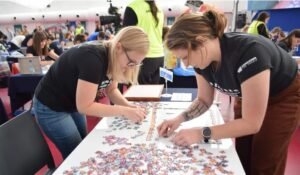Jigsaw puzzles are more than just a fun and relaxing activity—they are powerful tools for enhancing brain function. By engaging in puzzle-solving, individuals can significantly improve their memory and visual-spatial skills, two critical cognitive abilities that contribute to daily functioning and overall brain health. In this article, we will explore how jigsaw puzzles stimulate the brain, enhance mental capabilities, and contribute to cognitive resilience over time.

Understanding the Cognitive Benefits of Jigsaw Puzzles
What Are Visual-Spatial Skills?
Visual-spatial skills refer to the ability to understand and manipulate objects in a given space. These skills allow you to visualize how objects fit together, understand dimensions, and perceive spatial relationships. In the context of jigsaw puzzles, these skills are challenged and enhanced as you assess where individual pieces fit within the puzzle and how they relate to the surrounding pieces.
What is Memory?
Memory is the brain’s ability to encode, store, and retrieve information. It is essential for everything from recognizing faces to recalling facts and experiences. Jigsaw puzzles help strengthen memory by requiring you to remember the shapes, colors, and patterns of pieces as you assemble the puzzle.
How Jigsaw Puzzles Improve Memory
a. Strengthening Short-Term Memory
When you work on a jigsaw puzzle, especially one with many pieces, you need to remember the shapes, colors, and patterns of the pieces you’ve already viewed. You continuously recall this information as you try to find matching pieces and identify where they might fit. This active recall and repetitive task engagement can strengthen your short-term memory.
b. Enhancing Long-Term Memory
Working on puzzles that are completed over multiple sessions can enhance your long-term memory as well. As you piece together the puzzle, your brain creates stronger neural pathways related to visual recognition and spatial awareness. This process of remembering past pieces and their placement can help improve your ability to retain and retrieve information over time.
c. Boosting Working Memory
When solving jigsaw puzzles, you use your working memory to hold pieces in your mind’s eye as you search for their matching counterparts. Working memory is essential for reasoning, problem-solving, and decision-making. The more you practice with puzzles, the better your working memory becomes, enhancing your ability to tackle more complex tasks in other areas of life.
d. Building a Visual Memory Bank
Jigsaw puzzles encourage the brain to remember the layout of colors, shapes, and patterns. As you become familiar with certain puzzle motifs, you start recognizing and recalling similar structures in other puzzles or situations. This continuous mental exercise builds a visual memory bank, improving your ability to recognize and retrieve visual information.
How Jigsaw Puzzles Enhance Visual-Spatial Skills
a. Developing Spatial Awareness
As you work on a jigsaw puzzle, your brain constantly assesses how pieces fit together within a larger framework. You must consider the size, shape, and angle of each piece and its relationship to the pieces already in place. Over time, this process improves your spatial awareness, which is vital in many daily tasks, such as navigating through spaces, reading maps, and parking a car.
b. Improving Object Rotation
Jigsaw puzzles often require you to rotate pieces to find the correct fit. This action improves your ability to mentally rotate objects in space—a skill that is crucial in numerous real-world situations. Whether you’re assembling furniture, drawing, or even visualizing how to solve a complex math problem, mental rotation is a valuable skill that is enhanced by the puzzle-solving process.
Conclusion
Jigsaw puzzles are more than just a fun pastime—they are an effective way to enhance memory, visual-spatial skills, and cognitive function. By regularly engaging in puzzle-solving, you can strengthen short-term and long-term memory, improve spatial awareness, and boost mental agility. The process of assembling pieces enhances your ability to concentrate, perceive visual details, and think critically, all of which have profound effects on your cognitive abilities.



